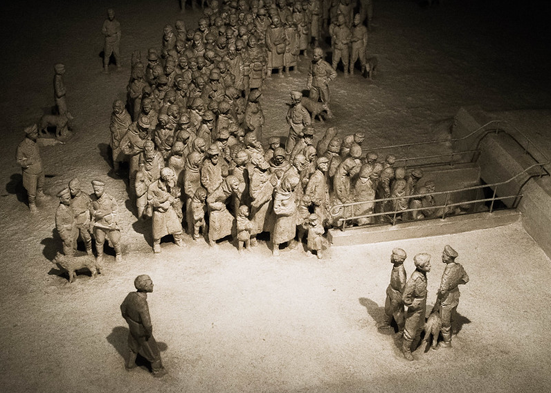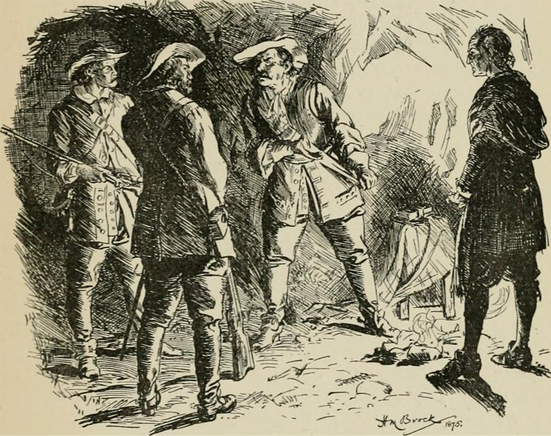Revised as of 29 March 2022
Hoo, boy, the difference between connive versus conspire is subtle.
A person who connives pretends not to know — la-di-dah, as they whistle innocently — while others plot and plan.
A person who conspires knows damn well what they’re all plotting.
Word Confusions…
…started as my way of dealing with a professional frustration with properly spelled words that were out of context in manuscripts I was editing as well as books I was reviewing. It evolved into a sharing of information with y’all. I’m hoping you’ll share with us words that have been a bête noir for you from either end.
If you found this post on “Connive versus Conspire” interesting, consider tweeting it to your friends. Subscribe to KD Did It, if you’d like to track this post for future updates.
| Connive | Conspire |
|---|---|

To the Gas Chambers by sbluerock is under the CC BY-NC-SA license, via VisualHunt. — Nazi soldiers and the German people connived at mass murder during World War II. |

Image from page 260 of Tales of the Covenanters, 1895, is courtesy of Internet Archive Book Images and has no known copyright restrictions, via Flickr. — Each knowingly conspires with the others. |
| Part of Grammar: | |
| Verb, intransitive
Third person present verb: connives |
Verb, intransitive & transitive; Verb, reciprocal
Third person present verb: conspires |
[connive at, connive in] Secretly allow something considered immoral, illegal, wrong, or harmful to occur
To avoid noticing something that one is expected to oppose or condemn
[Usually followed by at] To be indulgent toward something others oppose or criticize To pretend to be ignorant of something in order to escape blame [Archaic] To open and close the eyes rapidly
|
Verb, intransitive: Make secret plans jointly to commit an unlawful or harmful act
Verb, transitive: To try to bring about Verb, reciprocal: |
| Examples: | |
| You have it in your power to connive at my escape.
The government had connived with security forces in permitting murder. They connived to take over the business. The policeman connived at traffic violations. You should not connive at childlike exaggerations. “The artist is to teach them how to nod judiciously, and to connive with either eye.” – Spectator |
Verb, intransitive: They conspired against him. They deny conspiring to defraud the Internal Revenue Service. Everything conspires to exacerbate the situation. They conspired to kill the president. Verb, transitive: “Nor angry clouds conspire your overthrow” (Bishop Hall,”Defiance of Envy”). Verb, reciprocal: The defendant was accused of conspiring with his brother to commit robberies. |
| Derivatives: | |
| Adjective: conniving, unconnived, unconniving Adverb: connivingly Noun: connivance, conniver |
Adjective: conspiring, nonconspiring Adverb: conspiringly Noun: conspiracy, conspiration, conspirer Verb: preconspire, preconspired, preconspiring |
| History of the Word: | |
| Early 17th century, from the French conniver or the Latin connivere meaning shut the eyes (to), from con- (together) + an unrecorded word related to nictare (to wink). | Late Middle English from the Old French conspirer, which is from the Latin conspirare meaning agree, plot, from con- (together with) + spirare (breathe). |
C’mon, get it out of your system, bitch, whine, moan . . . which words are your pet peeves? Also, please note that I try to be as accurate as I can, but mistakes happen or I miss something. Email me if you find errors, so I can fix them . . . and we’ll all benefit!
Satisfy your curiosity about other Word Confusions on its homepage or more generally explore the index of self-editing posts. You may also want to explore Book Layout & Formatting Ideas, Formatting Tips, Grammar Explanations, Linguistics, Publishing Tips, the Properly Punctuated, Writing Ideas and Resources, and Working Your Website.
Resources for Connive versus Conspire
Apple Dictionary.com
Collins English Dictionary: conspire
Dictionary.com: connive, conspire
Lexico: conspire
Wikidiff: Connive vs Conspire
Pinterest Photo Credits:
Several tweets from Donald Trump and/or White House staff were combined.


